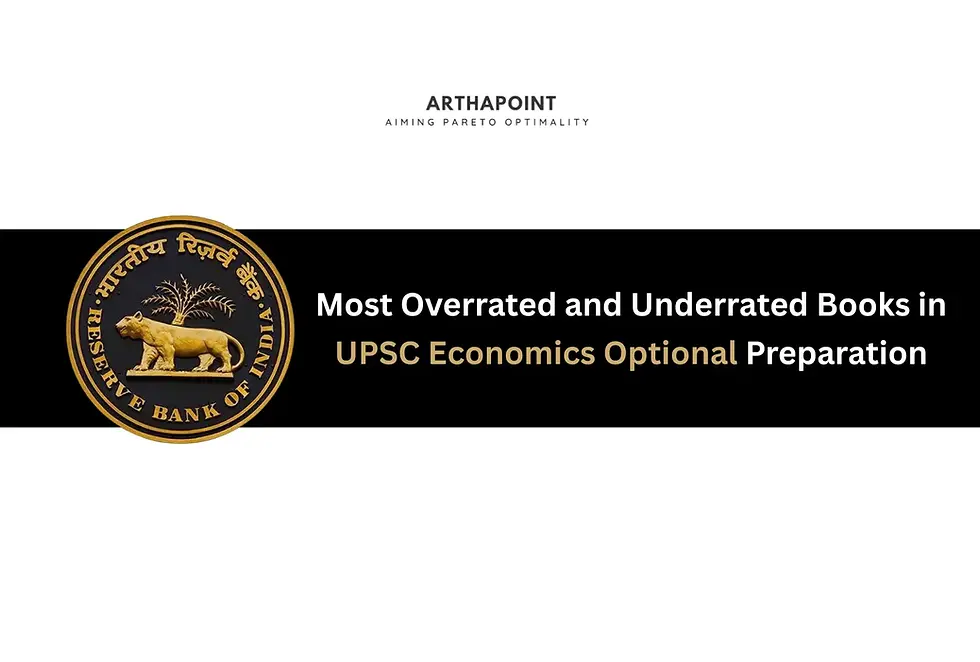Best Strategy to Tackle Current Economic Issues in UPSC Economics Optional Paper
- ArthaPoint
- Nov 3, 2025
- 4 min read
If you’re reading this, you’re probably preparing for UPSC with Economics as your optional. Maybe you’ve been at it for months. Maybe you just started. Either way, you’ve noticed something: the “current issues” part never seems to end.
Every morning brings new numbers. Inflation. Fiscal deficit. Growth projections. Oil prices. It never stops.And somewhere in between reading and revising, you start thinking — how much of this do I even need to know?
That thought is normal.Everyone who has ever studied Economics Optional has felt that same confusion.
The good news? You don’t need to know everything. You just need to understand what you read.
Begin with the basics
It sounds boring, I know.But this is where everything starts.
If you don’t understand what inflation really is, how will you explain why it rises?If you don’t know the logic behind fiscal deficit, how will you connect it to government spending or growth?
So, before diving into headlines, spend time with your basics. Read slowly. Try to explain each topic in your own words.
And if the theories feel too heavy, it’s okay to ask for help. There are people and places built exactly for that — like ArthaPoint Plus UPSC Economics Optional Classes. They don’t just teach; they explain things the way real people understand them.
Once your basics are clear, current issues stop feeling like random news. They start to make sense.
Read the news like an economist
Most people read the paper like they’re skimming for gossip.You can’t do that.
When you read that “RBI raised repo rates,” pause. Ask why.When you read that the rupee fell, think about what that means for imports.When you see a headline about job growth, ask what sectors are driving it.
That habit — of pausing and asking “why?” — will do more for you than any summary or coaching note ever could.
You don’t need every source
Too much reading can be as bad as too little.You don’t have to track ten newspapers or memorize every government scheme.
Pick a few reliable sources: The Hindu or Indian Express for context, PIB for official updates, and the Economic Surveyfor solid data.
When you make notes, don’t try to sound formal.Use your own words.Write small sentences.Draw arrows.Half-finished thoughts are fine — as long as you understand them later.
Write simply
UPSC answers don’t have to sound like research papers. They just need to sound clear.
When you write, imagine you’re explaining the topic to a curious friend who isn’t an economist.
Start with what’s happening, bring in the theory, add one recent fact, and end with your own balanced thought.
Like this:
“India’s recent inflation is driven more by supply constraints than by excess demand. While monetary tightening can reduce inflation, improving logistics and agricultural productivity offers a more lasting solution.”
That’s enough. It shows you understand what’s going on.
You’ll find economics everywhere
The best way to study this subject is to notice it in real life.
When prices rise, think inflation.When government launches a new highway project, think fiscal policy.When you see layoffs in the news, think demand cycle.
Once you start noticing economics around you, it becomes a living subject, not a pile of definitions.
Keep it visual, but not fancy
A small flow chart can make your answer easier to read:Fiscal Expansion → Increased Demand → Inflation → Policy Tightening.
That’s enough.Add one figure if you can remember it — from the Economic Survey or RBI reports — and move on.
Clean beats complicated.
Guidance matters
There’s a point where self-study hits a wall.Not because you can’t study alone, but because you stop seeing the big picture.
A good mentor helps you step back, connects the dots, and keeps you on track.That’s why many students trust ArthaPoint Plus UPSC Economics Optional Classes. They’re not about stuffing information — they’re about making sense of it.
Sometimes, what you need isn’t more content. It’s clarity.
Write regularly
One good answer a week is better than ten unread articles.
Pick a topic — say, inflation or fiscal deficit — and write a 10-mark or 15-mark answer. Time yourself. Then read it again after a few days. You’ll instantly see what you can improve.
That’s how toppers build confidence — little by little, week after week.
When it feels too much
You’ll have days when nothing makes sense.Days when you reread the same paragraph three times.Days when your head feels heavy and you wonder why you even chose this subject.
Take a break. Breathe.Then come back and do one small thing — revise one topic, read one article, or write one paragraph.
Consistency beats energy. Always.
Remember what this paper is really about
The Economics Optional isn’t a memory test.It’s a way for UPSC to see how you think — how calmly and logically you can explain something that’s always changing.
So don’t chase every fact.Don’t panic over every new report.
Understand a few things deeply, and use them well.
That’s all it takes.
And someday, when you finally write that paper, you’ll realize it wasn’t just about economics at all.It was about learning how to think — clearly, patiently, and with reason.
Keep going. You’re doing fine.





Comments